10 Races to Watch in Illinois' Primary Election
By Shelby Bremer • •
11 photos
1/11
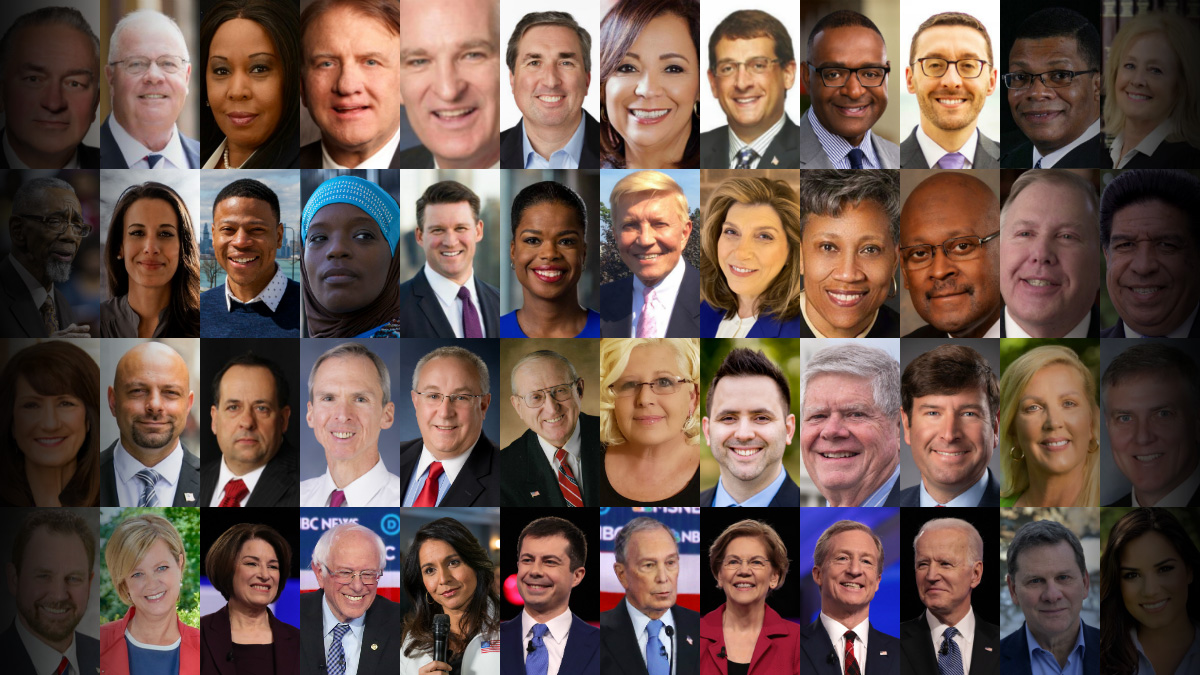
2/11
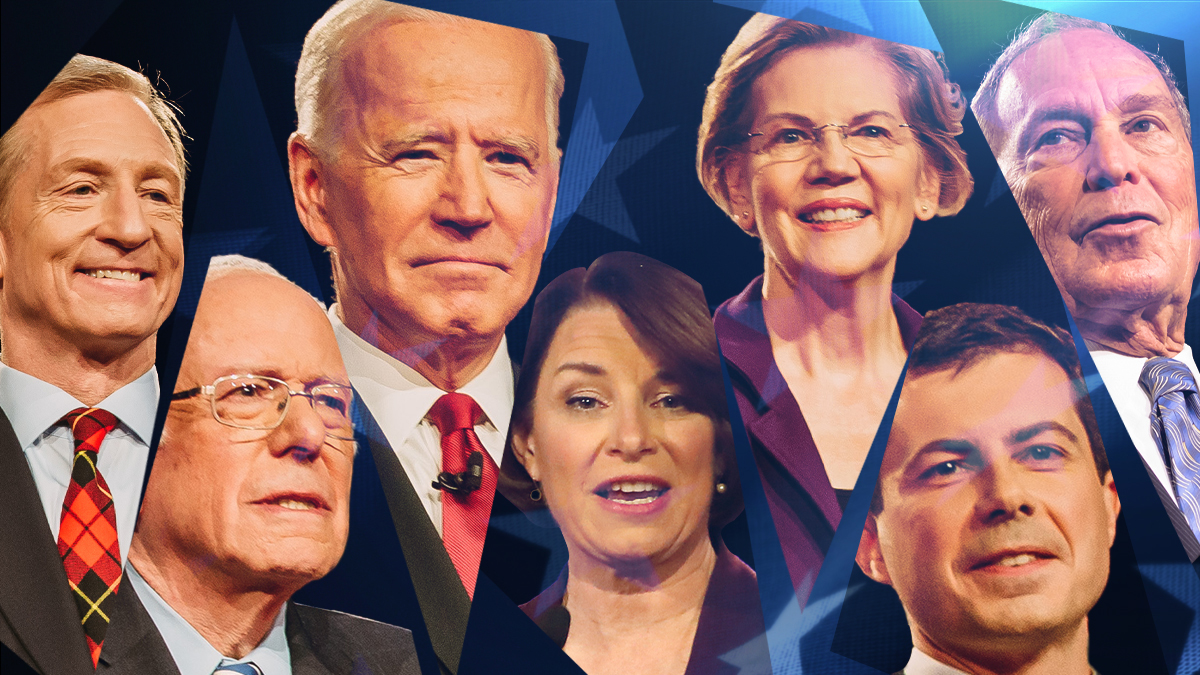
As the contentious primary for the Democratic nomination for president marches on, it seems increasingly likely that Illinois will vote when the race is still wide open, potentially having a decisive impact - even though the state’s Election Day is relatively late in the game.
The Democratic nominee will be officially selected by delegates in July at the party’s convention in Milwaukee. To win the nomination on the first ballot, a candidate must have locked up support from a simple majority of the 3,979 pledged delegates, which would be 1,990. That does not include automatic delegates (members of each state’s Congressional delegation and other elected officials or dignitaries) who, under a new rule, cannot vote in the first round if it will change the outcome of the state’s vote.
Illinois’ Election Day is two weeks after what’s known as “Super Tuesday,” when 16 primaries or caucuses will be held with more than 1,300 delegates up for grabs at once, including 415 from delegate-rich California and 228 from Texas. More than 1,800 delegates total will be allocated before Illinois votes - not enough to clinch the nomination, particularly in light of how many candidates are running.
“The way these things usually happen is by the time the third Tuesday in March rolls around, it’s usually winnowed down to two candidates,” Illinois State Board of Elections spokesman Matt Dietrich said, noting that this time, “there really hasn't been a winnowing down.”
With five people still in the race, results from earlier states could be spread across the candidates, with no single Democratic hopeful building a decisive lead. That makes Illinois’ primary – with 155 delegates up for grabs, the sixth-highest total of all 50 states – all the more important.
All five candidates currently in the race will appear on the Illinois ballot. They include, in alphabetical order: former Vice President Joe Biden, former New York City Mayor Michael Bloomberg, Rep. Tulsi Gabbard, Sen. Bernie Sanders and Sen. Elizabeth Warren. If any withdraw from the race before March 17, they will remain on the ballot alongside eight others who have already dropped out.
Will Illinois voters choose Sanders, who nearly pulled off an upset in the state in 2016, losing to Hillary Clinton by less than two points? Or perhaps they’ll go with Biden, who served alongside Illinois’ favorite son Obama. Scores of former Obama staffers and associates have also thrown their support behind Warren, who's staffed up and bought airtime in Chicago. Former New York City Mayor Mike Bloomberg is betting big on the Land of Lincoln – skipping contests in the “first four” states entirely, spending heavily on TV ads in Illinois and even courting Chicago Mayor Lori Lightfoot for her endorsement.
Illinois’ primary election will be held at the same time as Arizona, Florida and Ohio, with March 17 marking the first day a majority of delegates will have been allocated - potentially a pivotal moment in an already historic election.
3/11
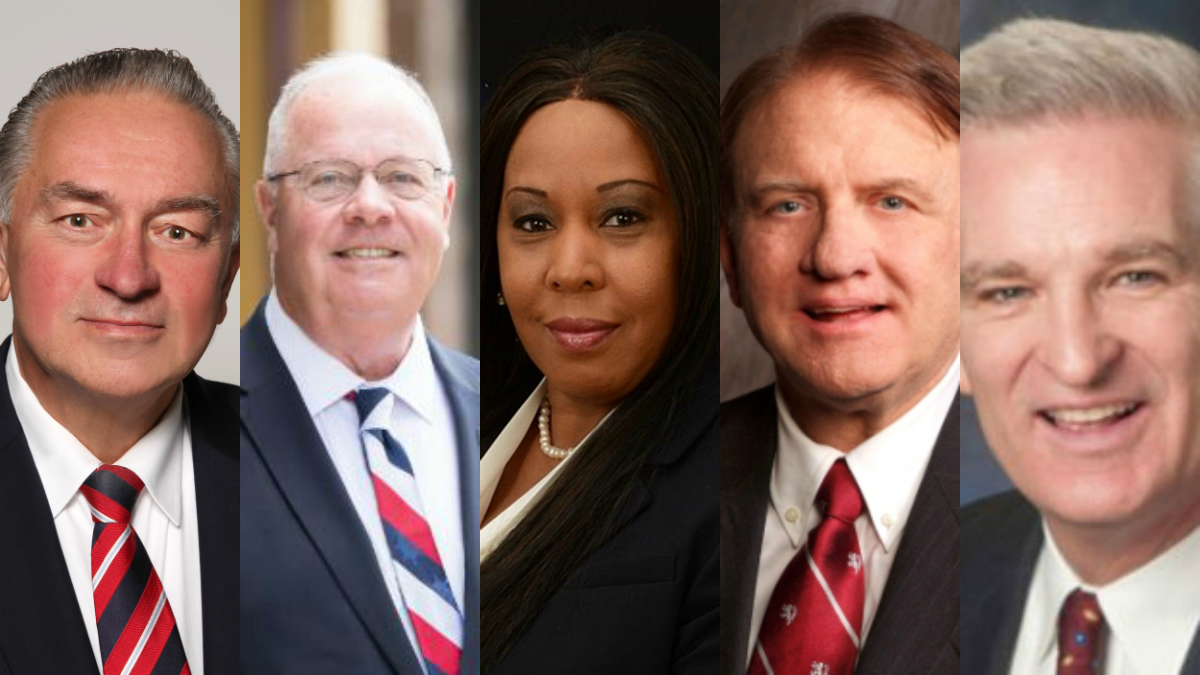
Sen. Dick Durbin is on the ballot again this year - and there are five Republicans looking to take him on in the fall. Durbin has been in office since 1997 and as the Democratic Whip, holds the second-highest position in party leadership in the Senate. Durbin’s long tenure, cash advantage and nearly 11-point general election victory in 2014 did not deter five candidates from throwing their hats in the ring - nor did the fact that Illinois has not voted for a Republican presidential candidate since 1988.
The candidates include: Casey Chlebek, Mark Curran, Peggy Hubbard, Robert Marshall and Tom Tarter. Chlebek is a retired information technology worker who, as a Polish immigrant, boasts heavy involvement in Illinois’ Polish community. Curran is an attorney and the only candidate with previous experience in elected office, as the Lake County Sheriff from 2006 - when he was elected as a Democrat, before switching parties in 2008 - through 2018. Hubbard is a Navy veteran, former police officer and retired IRS analyst from southern Illinois who told the Chicago Sun-Times she was a Democrat until a police officer fatally shot unarmed black teen Michael Brown in Ferguson, Missouri, in 2014. Marshall is a physician from suburban Burr Ridge and a perennial candidate who has unsuccessfully run for multiple offices since the 1980s as both a Republican and Democrat. He most recently ran for the Democratic nomination for Illinois governor in 2018 on a platform of wanting to, in part, split Illinois into three separate states. Tarter is a retired urologist and surgeon from central Illinois who also taught at the Southern Illinois University School of Medicine and is running in part on his experience in the healthcare industry.
All five of the candidates have expressed their support for President Donald Trump, likely in hopes that the man at the top of the ticket can give them a boost on Election Day.
4/11

The Democratic primary for Cook County state’s attorney is heating up into one of the most contentious races in the Chicago area. Incumbent State’s Attorney Kim Foxx is running for a second term and has drawn three opponents: Bill Conway, Donna More and former Chicago Ald. Bob Fioretti. Foxx was first elected in 2016, when she defeated embattled incumbent Anita Alvarez, who was under fire for her handling of the fatal police shooting of Laquan McDonald in 2014. Foxx previously served as an assistant Cook County state’s attorney for 12 years, then as chief of staff for Cook County Board President Toni Preckwinkle after that.
Conway is a former Cook County assistant state's attorney and reserve U.S. Naval intelligence officer whose father William Conway is the co-founder of The Carlyle Group, one of the largest private equity firms in the world. Conway’s father is worth about $3.1 billion, according to Forbes, and state records show he has contributed nearly $5 million to his son’s race as of February - giving him a major cash advantage in the race.
More is a former assistant U.S. Attorney and assistant Cook County state’s attorney who is now a partner at private law firm Fox Rothschild LLP, specializing in licensing and regulatory law. She previously ran for state’s attorney in 2016, earning just under 15% of the vote to come in third place behind Foxx and Alvarez.
Fioretti is a former Chicago alderman who represented the 2nd Ward from 2007 to 2015, when the redistricted map pushed him outside the ward’s boundaries. Instead of running in the new ward, he launched an unsuccessful bid for mayor of Chicago in 2015, then for a state Senate seat later that year, then for Cook County Board president in 2018 and again for mayor in 2019 - losing all four races.
The race has been contentious from the start, with one prominent case and its ensuing controversy casting a long shadow: that of actor Jussie Smollett. Accused of staging a racist and anti-gay attack on himself in Chicago in January 2019, Smollett - who starred in “Empire” at the time - was indicted on 16 felony counts of disorderly conduct that March. All charges against him were dropped later that month with little explanation - a move critics claimed was special treatment by Foxx's office. In August, a judge appointed a special prosecutor to investigate the case and in early February, a grand jury indicted Smollett once again on six felony counts of disorderly conduct.
In a November video announcing her reelection campaign, Foxx said she “didn’t handle it well,” marking the first time she’d admitted fault in the proceedings, which made national headlines. Smollett was indicted once again in the case in February. Foxx’s opponents have seized on the story to raise questions about the transparency of her office and allegations of preferential treatment. Conway, who has purchased the most television airtime of the candidates in the race, began running an ad in January featuring a client he represented - who was also charged with disorderly conduct for allegedly filing a false report - saying Foxx “did not care at all” about her case. Foxx has tried to keep the focus off Smollett though, and on her campaign promise of reform: touting on her website pushes for bail reform, exonerating wrongful convictions, and fewer prosecutions of non-violent offenders. That last point is one her opponents and critics like the Fraternal Order of Police have taken issue with, particularly her decision to increase the threshold for which shoplifters can be charged with a felony from $500 to $1,000 in stolen goods.
Foxx has the backing of the Cook County Democratic Party (led by her mentor Preckwinkle), and whoever wins the primary will likely cruise to victory over one of two Republican candidates in the race come November.
5/11
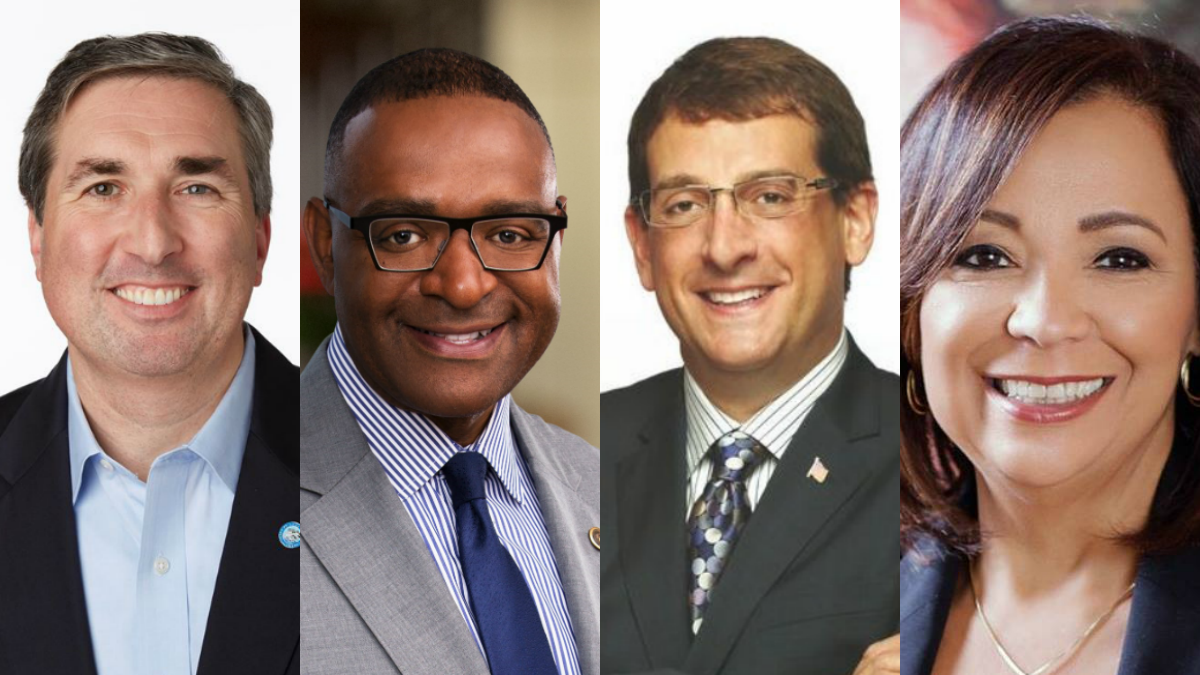
For the first time in 20 years, voters will soon elect a new clerk of the Circuit Court of Cook County, the second largest unified court system in the world - and an office that has been plagued by scandal and allegations of both inefficiency and corruption. Months after she was knocked off the ballot in the race for Chicago mayor, incumbent Clerk Dorothy Brown, long the subject of a federal investigation, announced in August that she would not seek another term in the position she was first elected to in 2000. Federal investigators seized Brown’s cell phone in 2015 while probing a 2011 land deal involving Brown’s husband and a campaign donor. Two of her former employees have since been convicted of perjury for lying to a grand jury about investigations into her office’s alleged bribe-for-jobs scheme.
Overseeing more than 1,300 employees and with an operating budget of more than $100 million dollars, the clerk serves as the official record keeper for the court system - responsible for maintaining all files of the judicial system and collecting court fines and fees, among other duties, for the judicial system that serves 5.2 million people and processes more than 1 million cases a year.
All four candidates seeking the Democratic nomination for the office - all but certain to win in November - are painting themselves as reformers looking to modernize the office long plagued by allegations of mismanagement and antiquated systems. The candidates include former Cook County Commissioner Richard Boykin, Cook County Board of Review Commissioner Michael Cabonargi, state Sen. Iris Martinez and attorney Jacob Meister.
Boykin is an attorney who represented Cook County's 1st District from 2014 to 2018, perhaps most widely known for his push to repeal the ill-fated soda tax in 2017. He lost his seat in a high-profile upset the following year. Boykin previously served as chief of staff to U.S. Rep. Danny Davis.
Cabonargi is an attorney who has served as a commissioner on the Cook County Board of Review since 2011. Prior to that he investigated fraud cases at the U.S. Securities and Exchange Commission. He has received the endorsement of the Cook County Democratic Party.
Having represented her Northwest Side district since 2003, Martinez was the first Hispanic woman elected to the Illinois Senate in state history and is now an assistant majority leader in the chamber.
Meister is an attorney who founded a non-profit organization focused on civil rights. He previously unsuccessfully ran against Brown in 2016 and for U.S. Senate in 2010.
All four candidates’ platforms prominently feature pledges for transparency in the office, better technology and digital records, as well as ethics reforms, particularly in the area of patronage hires - all not-so-thinly-veiled criticisms of Brown. The winner of the Democratic primary will go on to face the winner of the two candidates in the Republican primary, Pat O’Brien and Christopher Pfannkuche.
6/11
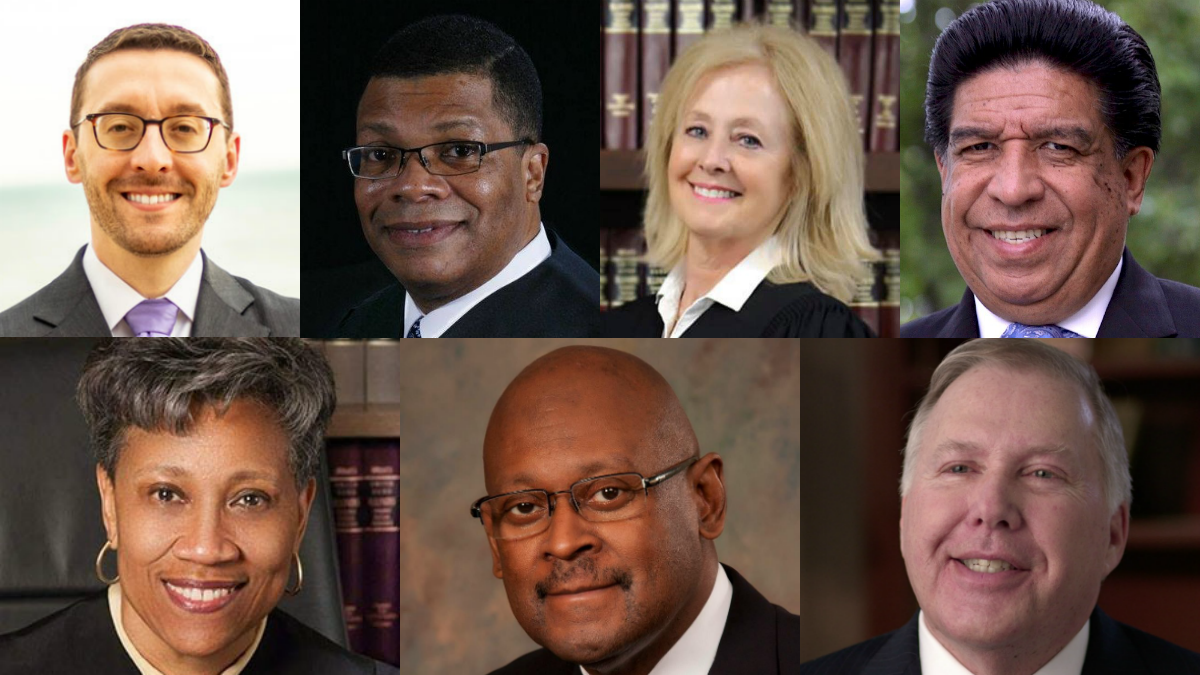
The Illinois Supreme Court’s only seat ever held by a person of color is up for grabs in the Democratic primary - with seven candidates vying for the job in a contest where race is certain to take center stage. First elected in 1990, Justice Charles Freeman was the first African-American to serve on the state’s highest court, as well as the first to serve as chief justice when he did so from 1997 to 2000. Freeman retired in 2018, and the Supreme Court appointed Justice P. Scott Neville to fill his seat through the end of the term.
Neville, who is also African-American, is running to win election to a 10-year term on the Supreme Court in his own right. Neville won the endorsement of the Cook County Democratic Party last year, controversial in that it came days after NBC 5 Investigates found he had received a homeowner exemption on property taxes for more than 15 years on a home in which he doesn’t live. The property in question listed his mother as the owner - and the applicant for the exemption, despite the fact that she died in 1991. A spokeswoman for Neville’s campaign said at the time that he was unaware of the issue, and he paid back four years of the exemption, as required.
Six other candidates are running against him: Nathaniel Howse, Cynthia Cobbs, Daniel Epstein, Shelly Harris, Margaret McBride and Jesse Reyes. All but Epstein, who is an attorney, currently serve as appellate judges in the 1st District. Howse and Cobbs are both African-American, with Cobbs - who has been in her position since 2015 and previously clerked for Freeman - looking to become the first African-American woman to serve on the court.
Howse, an appellate judge since his appointment in 2009, boasts the support of Secretary of State Jesse White, long Illinois’ top vote-getter, and Rep. Jan Schakowsky. Reyes is the only Latino candidate in the race, and if elected would be the first Latino on the Supreme Court. He has served on the Appellate Court since 2012. McBride, Harris and Epstein are white. McBride was elected to the Illinois Appellate Court in 1998 after serving as a Cook County associate judge for 11 years and working as an assistant state’s attorney prior to that.
Harris has been an appellate judge since his appointment in 2010, was a Circuit Court judge for 10 years before that after spending 30 years as a trial lawyer. He’s dipped into his personal wealth for the race far more than the other candidates (though a majority have donated to their own efforts in some capacity), loaning his campaign nearly $2 million since 2019. Epstein is an attorney who most recently worked as a litigator at Jenner & Block, leaving his position to campaign.
The state Supreme Court seat is one of three elected to the bench from Cook County, based on its population, with four others elected from districts across Illinois. One of the four others, Justice Lloyd Karmeier from southern Illinois’ 5th District, is also retiring at the end of his term, and three candidates - two Republicans and one Democrat - are running for his seat. Justices are elected to serve 10-year terms, at the end of which they stand for retention votes, with no term limits.
7/11
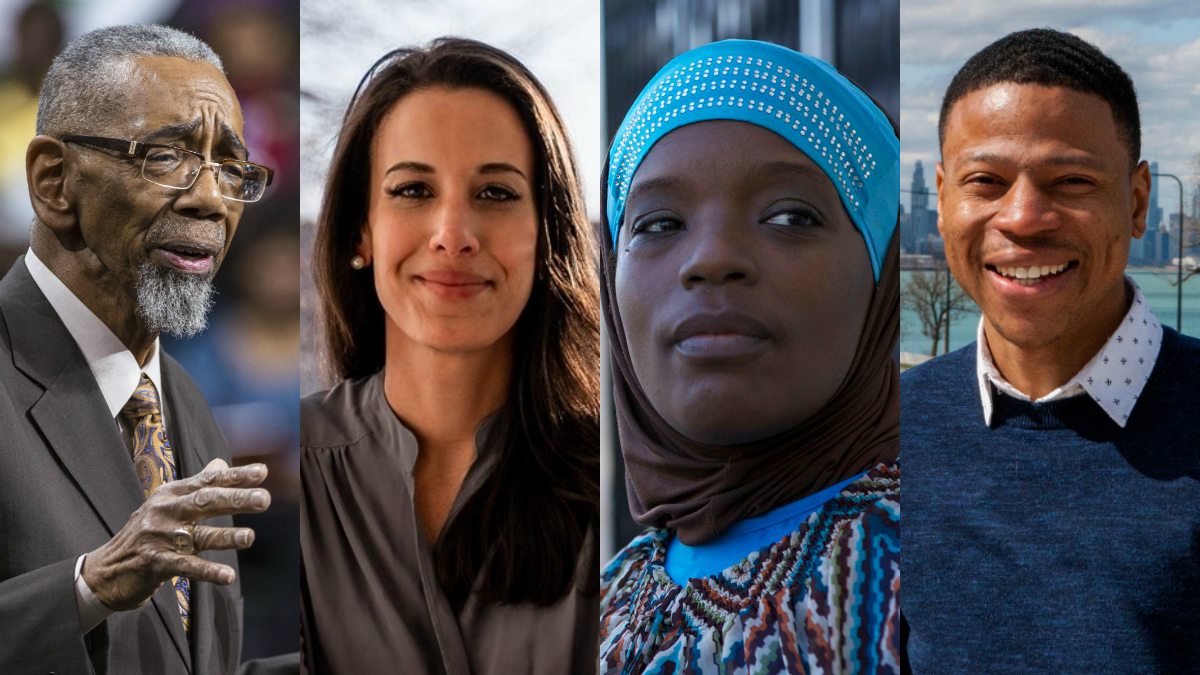
Rep. Bobby Rush is the longest-serving member of the House in Illinois' Congressional delegation, representing the 1st District, which includes part of Chicago's South Side and the southwest suburbs, since 1993. An Army veteran and ordained minister, Rush was involved in the civil rights movement and co-founded the Illinois chapter of the Black Panther Party in the 1960s before later leaving the organization.
This year, as more young people nationwide jump into the political fray, Rush will face four challengers for the Democratic nomination: Robert Emmons Jr., Sarah Gad and Ameena Nuur Matthews. Emmons, who is the youngest candidate in the race at age 27, has worked for nonprofits like OneGoal, an organization focused on educational opportunities, and the Obama Foundation. Gad is a law student, expected to graduate from the University of Chicago Law School this year, who turned her life around after landing in Cook County Jail as she battled an opioid addiction that stemmed from a near-fatal car accident. Matthews is an anti-violence activist whose work was the subject of the award-winning documentary "The Interrupters" in 2011.
Rush was a Chicago alderman before his election to Congress and has been in public office through several personal battles: the fatal shooting of his son in 1999, his cancer diagnosis in 2008 and the death of his wife of 37 years in 2017. He has since been outspoken against gun violence, was declared cancer-free and remarried a fellow minister in 2018. Rush has fended off more than a dozen Democratic primary challengers throughout his time in office, perhaps most notably defeating then-state Sen. Barack Obama in 2000 by a 2-to-1 margin. His last primary race was in 2016, when he handily defeated Chicago Ald. Howard Brookins Jr., one of his more well-known opponents in recent years, relatively speaking.
Rush earned the endorsement of the Chicago Sun-Times "for lack of a better choice," the paper's editorial board wrote - but the Chicago Tribune instead endorsed Emmons, calling him "eager to give constituents more energetic service." Among the most safely blue districts in the country, the winner of the primary will surely cruise to victory over the sole Republican candidate, Philanise White, in the fall.
8/11
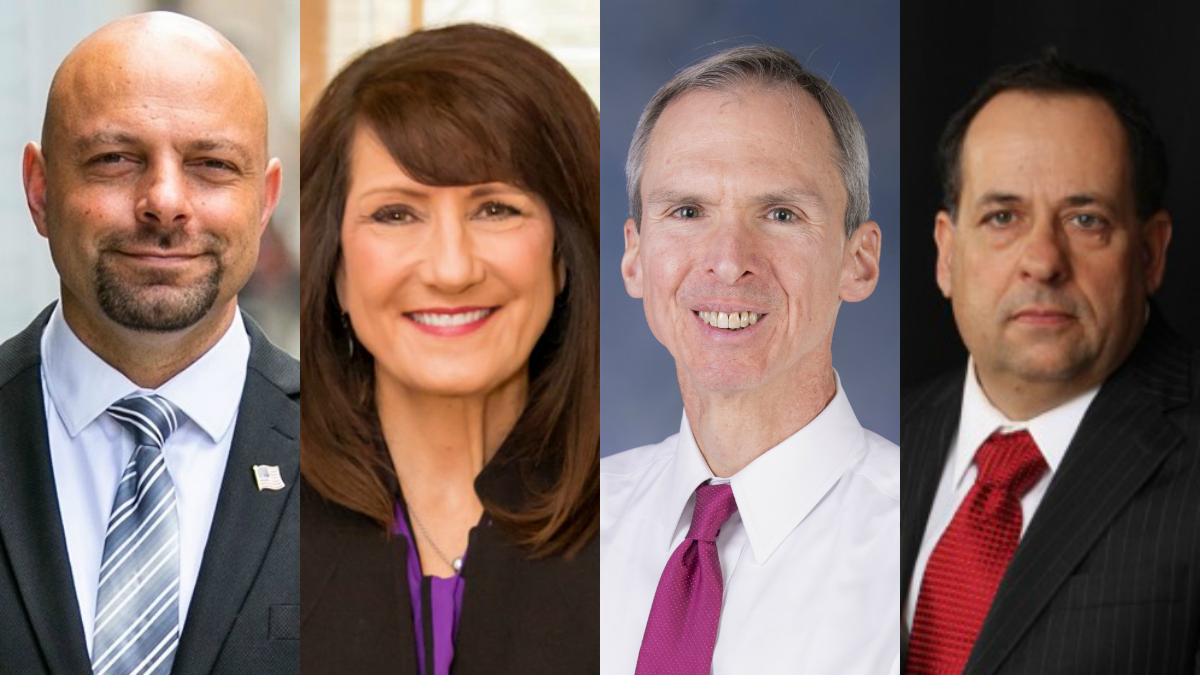
If the Democratic primary in Illinois’ 3rd District seems familiar – that’s because it is. The race is a rematch between incumbent Rep. Dan Lipinski and progressive challenger Marie Newman, joined this time by two new challengers: Rush Darwish and Charles M. Hughes.
Lipinski and Newman faced off in the Democratic primary in 2018, which Lipinski won by 2 points – a total of 2,145 votes separating him and Newman. The race garnered national attention pitting centrist and progressive voters against one another in what some saw as a fight for the soul of the Democratic Party.
Lipinski is now an eight-term lawmaker who took over the seat from his father and is seen as one of the most conservative Congressional Democrats. He's positioned himself against abortion rights, voted against the Affordable Care Act, and has taken other, more conservative stances on issues like immigration. Newman, a marketing consultant and anti-bullying advocate, is challenging him from the left once again by centering her campaign on policies like Medicare For All, a wealth tax, universal child care and more – earning endorsements from progressive Democrats like Sens. Bernie Sanders and Elizabeth Warren, as well as Rep. Alexandria Ocasio-Cortez, among others.
Darwish is a former television news anchor and sports reporter who now owns a multimedia production company in Chicago. He’s advocating for, among other policies, a public option for health insurance, calling it “Medicare for all who want it,” over a single-payer system championed by Newman. Hughes told the Sun-Times that he is a mechanic for Nicor Gas who previously worked in the political operation of former Rep. Bill Lipinski, his now-opponent’s father.
The district, encompassing Chicago's Southwest Side and its surrounding suburbs, is a Democratic stronghold, all but guaranteeing the primary winner a victory in November.
9/11
![REPUBLICAN PRIMARY FOR ILLINOIS' 3RD CONGRESSIONAL DISTRICT<br><br>In 2018, more than 57,000 people voted to send Holocaust denier and white supremacist GOP nominee Art Jones to Congress in Illinois’ 3rd District. Jones ran against incumbent Rep. Dan Lipinski in the November general election, making the ballot after running unopposed in the March Republican primary. Jones – a former leader of the American Nazi Party who calls the Holocaust “an extorsion [sic] racket” on his website – has unsuccessfully run for elected office several times since the 1970s, including the same Congressional seat now six times before. He failed to make the ballot in 2016 after the Illinois Republican Party challenged his petition signatures, but in the most recent cycle, the state GOP declined to challenge his candidacy or run another candidate, clearing his path to the nomination. The party ultimately denounced Jones and two write-in candidates ran for the seat, though the safely blue district sent Lipinski back to Washington. Jones filed to run again, but this time there are two other candidates: Mike Fricilone and Catherine O’Shea. Fricilone is the executive sales director of an office furniture dealer and a member of the Will County Board since 2012, running on a platform focused on tax reduction. O’Shea told the Beverly Review that she is a real estate agent and hairdresser, who switched from the Democratic Party to the GOP in 2016. Though the district may strongly Democratic, the race remains one to watch to see just how many voters will cast their ballots for a man who has marched with a swastika armband.](https://media.nbcchicago.com/2019/09/3rd-District-Republican-Primary-candidates.png?fit=1200%2C675&quality=85&strip=all)
In 2018, more than 57,000 people voted to send Holocaust denier and white supremacist GOP nominee Art Jones to Congress in Illinois’ 3rd District. Jones ran against incumbent Rep. Dan Lipinski in the November general election, making the ballot after running unopposed in the March Republican primary. Jones – a former leader of the American Nazi Party who calls the Holocaust “an extorsion [sic] racket” on his website – has unsuccessfully run for elected office several times since the 1970s, including the same Congressional seat now six times before. He failed to make the ballot in 2016 after the Illinois Republican Party challenged his petition signatures, but in the most recent cycle, the state GOP declined to challenge his candidacy or run another candidate, clearing his path to the nomination. The party ultimately denounced Jones and two write-in candidates ran for the seat, though the safely blue district sent Lipinski back to Washington. Jones filed to run again, but this time there are two other candidates: Mike Fricilone and Catherine O’Shea. Fricilone is the executive sales director of an office furniture dealer and a member of the Will County Board since 2012, running on a platform focused on tax reduction. O’Shea told the Beverly Review that she is a real estate agent and hairdresser, who switched from the Democratic Party to the GOP in 2016. Though the district may strongly Democratic, the race remains one to watch to see just how many voters will cast their ballots for a man who has marched with a swastika armband.
10/11
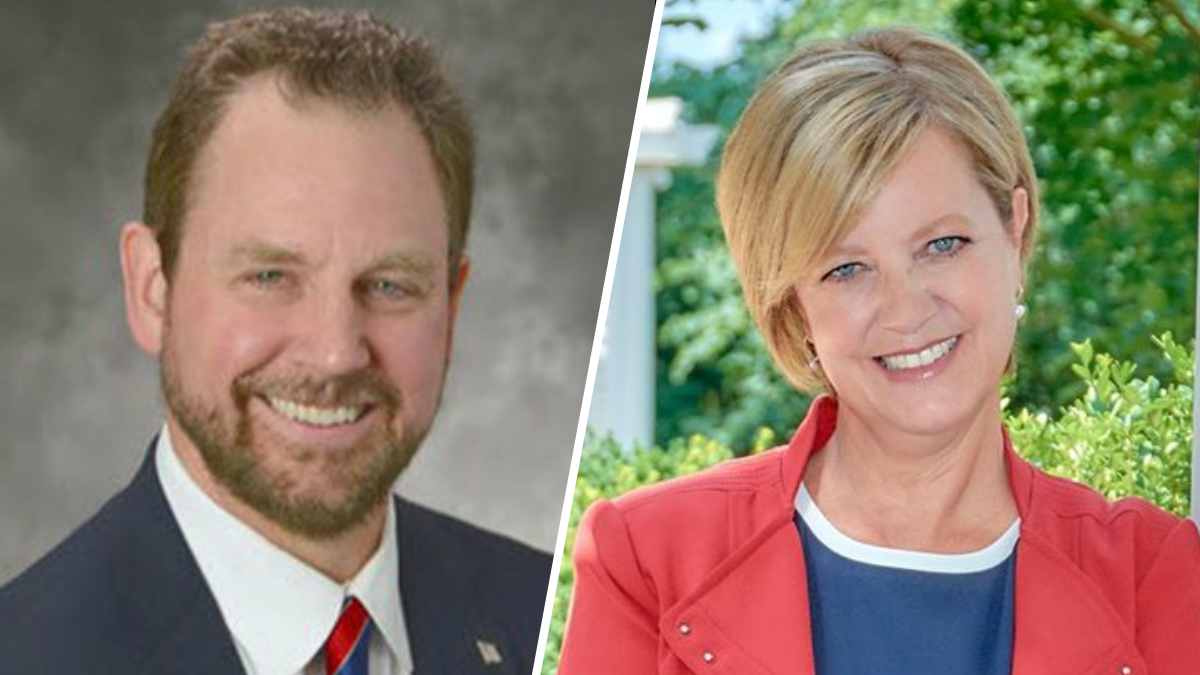
In the last election cycle, the 6th District was one of Democrats’ top targets in their efforts to regain control of the House. Rep. Sean Casten turned the longtime Republican stronghold in the western suburbs blue in 2018 - and now two Republicans are looking to take it back in the fall. But first they’ll have to face off in the GOP primary.
One is a familiar face: former state Rep. Jeanne Ives, the conservative firebrand who mounted a nearly-successful primary challenge against incumbent Gov. Bruce Rauner in 2018. A West Point graduate and Army veteran, Ives represented her west suburban statehouse district, including parts of Wheaton, Winfield and Naperville, in the General Assembly from 2013 to 2019. She threw her hat in the 2018 gubernatorial race, challenging Rauner from the right and gaining the support of conservative groups, donors and voters angered by his signing of legislation to allow Illinois to cover abortions for state employees and Medicaid recipients, as well as a measure to make Illinois a so-called “sanctuary state,” among other issues. One of the most notable elements of her campaign was a controversial ad featuring actors thanking Rauner for bills he had signed, including an actor depicting a transgender individual, thanking Rauner for allowing bathroom access in Illinois. Though the state GOP denounced the ad and it was widely decried as offensive, Ives - with far less cash than Rauner - lost by just three points statewide. But Ives carried her home base of DuPage County - which makes up a large portion of the 6th District - by four points.
This time, she’ll face Gordon “Jay” Kinzler, a surgeon and Army Reserve colonel from Glen Ellyn. Kinzler says on his website that he is “pro-life,” believes the Affordable Care Act “has been a complete failure” and that he believes there is an “immediate need to enforce laws regulating foreign nationals entering our nation. In local government, he previously served as president of the Glen Ellyn Park District Board and commissioner of Glen Ellyn’s Environmental Commission, according to his website. The winner of the Republican primary will face Casten in November, two years after he beat incumbent Rep. Peter Roskam by 7 points, making Casten the first Democrat to represent the district since 1972.
11/11

In 2018, Democrats eyed Illinois’ 14th District as a potential long shot pick-up in their bid to take back the House. Rep. Lauren Underwood proved she was up to the task, ousting longtime incumbent Rep. Randy Hultgren in a stunning upset. Underwood won by 5 points in a highly competitive suburban battleground race, making her the first African-American, the first woman and the first Millennial to ever represent the district.
This time around, the tables have turned and Republicans are the ones lining up to be the one to take Underwood on in November. Containing parts of McHenry, Kane, Lake and Will counties, among others, the district was long a Republican stronghold - represented from 1987 to 2007 by Dennis Hastert, the longest-serving Republican Speaker of the House who served a prison sentence in connection with a hush money scheme to hide his history of sexually abusing young boys. President Donald Trump won the district by 4 points in 2016, which was down from Mitt Romney’s 10-point margin of victory four years earlier - but a victory nonetheless. With Trump at the top of the ticket again this year, seven Republicans jumped into the primary race with hopes that the presidential re-election campaign might buoy Republican efforts to win the district back.
The candidates include: Anthony Catella, Jerry Evans, Ted Gradel, Catalina Lauf, Jim Marter, Jim Oberweis and Sue Rezin. Catella is an Army veteran and former priest, he said in a letter announcing his candidacy, as well as a Republican precinct committeeman in St. Charles Township. Evans, of Warrenville, is the founder and director of the Jerry Evans School of Music in Wheaton. Gradel is a financial futures trader from Naperville who also coaches girls youth basketball. Lauf, of Woodstock, is the youngest candidate in the race. She works for her father’s small business after a stint as a Trump-appointed advisor to the U.S. Department of Commerce, and worked for Uber before that.
Marter is a software business consultant from Oswego who previously chaired the Kendall County Republican Central Committee and unsuccessfully tried to primary then-Sen. Mark Kirk from the right in 2016. Oberweis is an Illinois state senator from Sugar Grove, in office since 2013. He chairs his family’s Oberweis Dairy business, purchasing it more than 30 years ago after starting a career in finance. A perennial candidate, Oberweis has run for U.S. Senate three times since 2002, governor in 2006 and Congress in 2008. He’s used his considerable wealth to fund campaigns in the past, and this race is no different, as he’s loaned his campaign $1 million in the past year - making him by far the most well-funding GOP candidate. Rezin, of Morris, is also a state senator, serving as an assistant Republican leader in the legislature’s upper chamber. She touts her record of winning legislative races, but Rezin lives just outside the district’s boundaries, in the 16th Congressional District - though her state Senate district has some overlap with the 14th.
All seven of the candidates are painting themselves as fairly hard-line conservatives, some more than others, but with many explicitly hanging their hats on Trump support in an effort to emerge from the GOP primary victorious. The winner will face Underwood in November in a race that’s sure to draw national attention.





